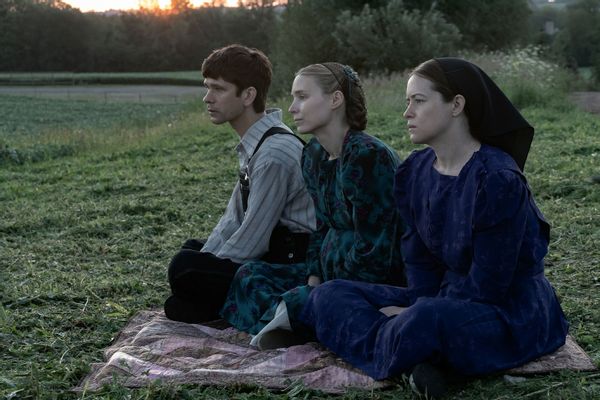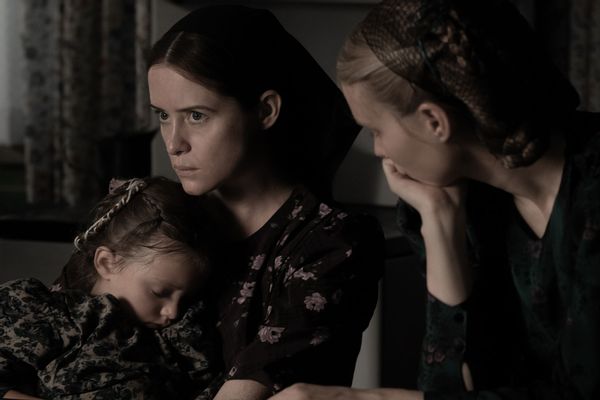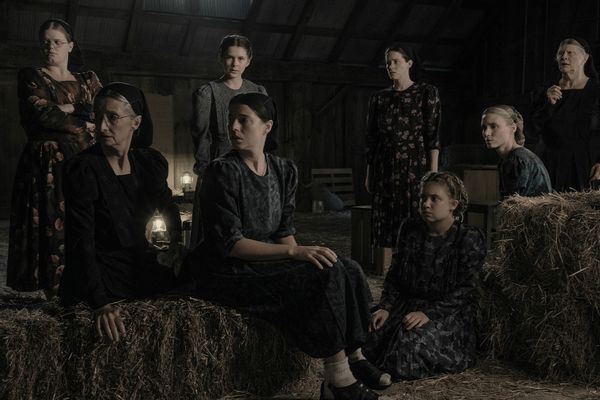After abuse,”Women Talking” challenges the misuse and metamorphosis of forgiveness
An early scene in “Women Talking” shows two teenage girls sitting side by side in the loft of a barn. Wordlessly, one begins to undo the folds and twists of the other’s intricate braid, and by the time the camera cuts back to them, they are tying off a new braid that blends their long hair together. Meanwhile, the other women in the room debate the possibilities and hazards of forming a new social order. The unruly braid that now binds the two girls, the intimacy and the whimsy of it, captures in simplified miniature the sort of reimagined order the women seek.
The girls, Autje (Kate Hallett) and Neitje (Liv McNeil), are in the loft listening to their mothers, aunts, and grandmothers talk. It’s a heavy conversation: the women are members of a rural Mennonite colony, gathered to decide what to do in the aftermath of the discovery that men in the colony have been sneaking into women’s bedrooms, drugging them in their sleep with horse tranquilizer and raping them.
Brief flashbacks show the women waking bloodied, aching, confused and terrified. One of them, Ona (Rooney Mara), is pregnant with her assailant’s child; another, Salome (Claire Foy), walked a day and a half with her four-year-old daughter on her back to procure antibiotics for the sexually transmitted disease the child now suffers from. Neitje herself was taken in by Salome after her own mother died by suicide after an assault. Another woman, Mejal (Michelle McLeod), has taken up smoking and suffers intermittent panic attacks, and Autje’s mother Mariche (Jessie Buckley) attempts to bottle up her anger but betrays her fury and impatience with frequent snaps and barbs levied at the others.
The film, directed by Sarah Polley and nominated for Best Picture at the upcoming Oscars, is an adaptation of Miriam Toews’ 2018 novel, which is itself based on a true story. Polley’s most significant revision of Toews’ text is to make Autje’s perspective the guiding consciousness of the film. (The novel is narrated by a kind and shy young man named August, who takes the minutes of the women’s meeting since they cannot read or write themselves.) The decision to frame the story through Autje’s voice instead, with her watchful gaze bearing witness to the proceedings, underscores both how deeply fraught this high-stakes decision is and how powerfully its potential effects might reverberate across generations.
 Ben Whishaw stars as August, Rooney Mara as Ona and Claire Foy as Salome in “Women Talking” (Michael Gibson/Orion Pictures)The male leaders of the community have given the women two days to decide whether they will forgive their attackers or leave the colony altogether, on penalty of excommunication. According to their faith tradition, excommunication would entail forfeiting their places in heaven. The women are devout, but they are also furious — their faith and their rage provide the twin compasses that guide their debate. As they talk, it becomes clear that the knot at the center of their problem is the question of forgiveness, which seems at once spiritually necessary and emotionally impossible. Attempting to thread a needle between justice and peace, the women deliberate over three options: do nothing, stay and fight or leave.
Ben Whishaw stars as August, Rooney Mara as Ona and Claire Foy as Salome in “Women Talking” (Michael Gibson/Orion Pictures)The male leaders of the community have given the women two days to decide whether they will forgive their attackers or leave the colony altogether, on penalty of excommunication. According to their faith tradition, excommunication would entail forfeiting their places in heaven. The women are devout, but they are also furious — their faith and their rage provide the twin compasses that guide their debate. As they talk, it becomes clear that the knot at the center of their problem is the question of forgiveness, which seems at once spiritually necessary and emotionally impossible. Attempting to thread a needle between justice and peace, the women deliberate over three options: do nothing, stay and fight or leave.
The concept of forgiveness, its power and its limitations, provides the essential metric against which the women evaluate their options.
The conversation is contentious, to say the least. Scarface Janz (Frances McDormand) argues in favor of staying: “It is part of our faith to forgive. If we are excommunicated, we forfeit our place in heaven.” Salome scoffs at this: “I cannot forgive them. I will never forgive them,” a sentiment Mejal echoes. Ona, the most idealistic of the set, meanwhile muses over the metaphysics of forgiveness: “Is forgiveness that’s forced upon us true forgiveness?” The concept of forgiveness, its power and its limitations, provides the essential metric against which the women evaluate their options.
Autje and Neitje don’t say much, and initially, their only contributions are expressions of frustration. “Why are you making this so complicated?” an exasperated Autje cries out. “It’s very, very boring,” Neitje muses flatly. The girls’ antics — swinging from ceiling beams, loudly knocking over a pail while hobbling around with their hair intertwined, plotting and executing a prank to shock the others — betray their impatience. As they see it, hashing out the abstruse subtleties wrapped up in the idea of forgiveness is a distraction from the task at hand.
 Emily Mitchell stars as Miep, Claire Foy as Salome and Rooney Mara as Ona in “Women Talking” (Michael Gibson/Orion Pictures)But as the sun sets over the horizon and the talk spins on and on, a turn in the conversation suddenly thrusts Autje into the center of a situation that forces her to confront the complexities of forgiveness on deeply personal, and deeply painful, terrain. An exchange between Ona and Mariche unexpectedly deflects the issue of forgiveness on to a separate but adjacent context, one that implicates Autje directly. Ona questions Mariche’s argument in favor of staying and fighting by bringing up the fact that Mariche’s husband and Autje’s father, Klaas, has a reputation for drinking and abuse. Ona asks Mariche why she wants to fight now, even though she has never stood up to Klaas’ past aggressions for her own sake or that of her children. At this question, Mariche explodes, spewing insults at Ona with the intensity of a cornered animal, making it clear that Ona has hit a nerve. The camera cuts to Autje, looking on with mouth trembling, softly repeating “Stop . . . stop it,” though it’s not clear precisely whom she’s addressing.
Emily Mitchell stars as Miep, Claire Foy as Salome and Rooney Mara as Ona in “Women Talking” (Michael Gibson/Orion Pictures)But as the sun sets over the horizon and the talk spins on and on, a turn in the conversation suddenly thrusts Autje into the center of a situation that forces her to confront the complexities of forgiveness on deeply personal, and deeply painful, terrain. An exchange between Ona and Mariche unexpectedly deflects the issue of forgiveness on to a separate but adjacent context, one that implicates Autje directly. Ona questions Mariche’s argument in favor of staying and fighting by bringing up the fact that Mariche’s husband and Autje’s father, Klaas, has a reputation for drinking and abuse. Ona asks Mariche why she wants to fight now, even though she has never stood up to Klaas’ past aggressions for her own sake or that of her children. At this question, Mariche explodes, spewing insults at Ona with the intensity of a cornered animal, making it clear that Ona has hit a nerve. The camera cuts to Autje, looking on with mouth trembling, softly repeating “Stop . . . stop it,” though it’s not clear precisely whom she’s addressing.
What happens next in this scene, where the tension has abruptly reached a boiling point, offers a brief and poignant glimpse at what a new economy of forgiveness might look like, unfolding in the small and removed microcosm of the barn loft. Ona apologizes to Mariche, who begins to calm down until a second, unexpected apology is issued, this time from Mariche’s mother and Autje’s grandmother, Greta (Sheila McCarthy).
“What you were required to do was a misuse of forgiveness.”
“I am also sorry, Mariche,” Greta says solemnly. “What you say is true. You had no choice. You forgave him again and again, as you were told to. As I told you to. I’m sorry. I’m sorry. I’m sorry. I’m sorry,” she says, ending in tears. The camera cuts to Autje, crying silently, as Greta finishes: “What you were required to do was a misuse of forgiveness.”
Greta asks her daughter to forgive her for having encouraged Mariche to forgive Klaas: forgive me for expecting you to forgive him, she begs. This marks a slight shift in the center of gravity. No longer does forgiveness seem like a simple zero-sum game in which the victim inevitably gives and the offender ultimately gains. Instead, a more diffuse transaction comes into focus, a sort of forgiveness that circulates collectively rather than limiting itself to a direct one-on-one exchange. The contrast is clear between this moment and the version of forgiveness that the men’s ultimatum demands — that iteration is not possible and not desirable. Instead, the exchange that occurs between Greta and Mariche unfolds according to a different model, one that is spontaneous, fragile and poignant.
This is a moment of clarity, in which all of the women in the room witness together both the necessity of forgiveness and its irreducible complications, its transformative power alongside its dangerous amenability to injustice. As Agata (Judith Ivey) points out, forgiveness becomes problematic when it seems to convey permission. Hearing this, Autje, who also has suffered Klaas’ violence firsthand, crosses the room and goes to her mother. Mariche reaches down to cradle Autje’s face and then pulls her into a tight embrace, both shaking with sobs.
By elevating Autje’s structural significance in the story, Polley invites us to contemplate the contours of forgiveness from within.
Autje suddenly looks much younger, a child seeking comfort in her mother’s arms, even though her gesture is both a request for as well as an offering of the necessary care. Autje has watched her mother forgive her mother’s own mother, and her embrace with Mariche conveys a permutation of that same forgiveness unfolding one generation down the line. Klaas and his violence may have precipitated the situation, but he is not given the power to set the terms by which they will access peace and move forward.
 Michelle McLeod stars as Mejal, Sheila McCarthy as Greta, Liv McNeil as Neitje, Jessie Buckley as Mariche, Claire Foy as Salome, Kate Hallett as Autje, Rooney Mara as Ona and Judith Ivey as Agata in “Women Talking” (Michael Gibson/Orion Pictures)“Have we made a decision? Are we leaving?” Greta asks shortly after this, as night falls in the loft. It is Autje who answers decisively: “Yes.” By elevating Autje’s structural significance in the story, Polley invites us to contemplate the contours of forgiveness from within. A new order premised on a new model of forgiveness may be full of snags and sticking points, but it also contains spots of breathtaking tenderness and possibility. Autje and Neitje represent the threshold of the future, fully aware of the trauma of the past but prepared to imagine that something better might lie ahead.
Michelle McLeod stars as Mejal, Sheila McCarthy as Greta, Liv McNeil as Neitje, Jessie Buckley as Mariche, Claire Foy as Salome, Kate Hallett as Autje, Rooney Mara as Ona and Judith Ivey as Agata in “Women Talking” (Michael Gibson/Orion Pictures)“Have we made a decision? Are we leaving?” Greta asks shortly after this, as night falls in the loft. It is Autje who answers decisively: “Yes.” By elevating Autje’s structural significance in the story, Polley invites us to contemplate the contours of forgiveness from within. A new order premised on a new model of forgiveness may be full of snags and sticking points, but it also contains spots of breathtaking tenderness and possibility. Autje and Neitje represent the threshold of the future, fully aware of the trauma of the past but prepared to imagine that something better might lie ahead.
It’s telling that Autje and Neitje are the only two who answer the call to be counted for the 2010 census. When the census taker drives through the colony in his truck, incongruously blaring a Monkees song, all of the other women ignore his megaphone instructions to come out and be recorded. Perhaps it is habit that makes each of them shut the windows and stay indoors, and fear or simple obedience that keeps the younger children at home. But Autje and Neitje sprint forward, presenting themselves to this outsider who stands in for the wide world beyond the colony. The camera focuses on the man’s face framed in his truck mirror, his sunglasses and easy smirk initially conveying a vague whiff of sexualized danger. But the girls are a match for it, smiling and holding a conversation with him, a strange man who perhaps is indeed a threat, but surely not one greater than what they’ve already faced and overcome. He drives off, and they return to the women talking.
Disobeying the colony norms, they respond to a different summons and ensure that their presence will be recorded. In doing so, Autje and Neitje firmly establish themselves on the fulcrum of a new futurity — unfamiliar, uncertain, and irresistible.
“Women Talking” is currently in theaters.
Read more
about this topic

